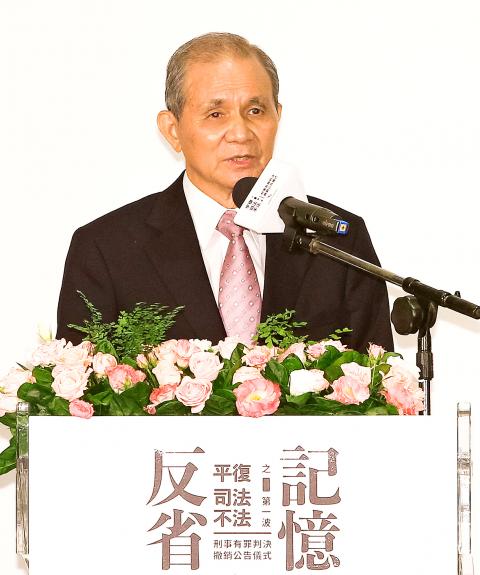Huang Huang-hsiung (黃煌雄) yesterday resigned as chairman of the Transitional Justice Commission after an uproar last month concerning an alleged plan by his former deputy to target a Chinese Nationalist Party (KMT) mayoral candidate.
Huang said in a statement that he took the reins in May with the belief that transitional justice would provide legitimacy and legality for past democratic movements, transcending party politics.
“However, the Sept. 12 incident ruined the big picture and overshadowed the commission soon after its establishment with the stigma of being another Eastern Depot,” Huang said, alluding to the pan-blue camp’s comparison of the commission to a Ming Dynasty secret police and spy agency.

Photo: CNA
On Sept. 12, Chinese-language media reported a partial recording of an unofficial commission meeting on Aug. 24 called by then-commission deputy chairman Chang Tien-chin (張天欽), in which Chang allegedly discussed a plan to target KMT New Taipei City mayoral candidate Hou You-yi (侯友宜) using a lustration law.
Hou headed the Taipei Police Department’s Criminal Investigation Division in its failed attempt to arrest democracy advocate Deng Nan-jung (鄭南榕) at the office of his Freedom Era Weekly magazine in 1989. Deng refused to be taken alive and self-immolated in the office.
The incident raised doubts about the Executive Yuan-affiliated body’s impartiality, prompting calls from the pan-blue camp for the commission to be abolished.
Five of the six people at the meeting, including Chang, have resigned.
Huang said that the incident added to political distrust, making the already challenging task of transitional justice all the more difficult.
Huang said that while he was not made aware beforehand of the content to be discussed at an unofficial commission meeting that sparked the Sept. 12 incident, the mindset and views demonstrated that day nevertheless ran counter to the dangwai (黨外, “outside the party”) spirit, which he has adhered to for more than three decades.
“I shouldered the burden [of the chairmanship] for the sake of transitional justice. My letting go is also for the goal of transitional justice,” Huang said, adding that he hopes his resignation would allow the commission to renew and ensure its pursuits of “truth, responsibility, justice and reconciliation.”
Premier William Lai (賴清德) “reluctantly” approved Huang’s resignation after urging him several times to stay, the Executive Yuan said in a statement.
“The exoneration on Friday of wrongfully convicted individuals underscores the significance of the commission’s role in realizing transitional justice,” the Executive Yuan said, adding that Lai appreciated Huang’s bravery in shouldering the strenuous task and admired his decision to take responsibility for the scandal.
Commission member and spokeswoman Yang Tsui (楊翠) said that commission staff were not aware of Huang’s resignation beforehand and only learned yesterday that he had tendered oral resignations to Lai several times.
As the commission has a two-year deadline, its members and employees would continue its work despite Huang’s departure, Yang said.
According to the Act on Promoting Transitional Justice (促進轉型正義條例), a replacement chairperson is to be nominated by the premier and appointed with the consent of the Legislative Yuan.

SECURITY: As China is ‘reshaping’ Hong Kong’s population, Taiwan must raise the eligibility threshold for applications from Hong Kongers, Chiu Chui-cheng said When Hong Kong and Macau citizens apply for residency in Taiwan, it would be under a new category that includes a “national security observation period,” Mainland Affairs Council (MAC) Minister Chiu Chui-cheng (邱垂正) said yesterday. President William Lai (賴清德) on March 13 announced 17 strategies to counter China’s aggression toward Taiwan, including incorporating national security considerations into the review process for residency applications from Hong Kong and Macau citizens. The situation in Hong Kong is constantly changing, Chiu said to media yesterday on the sidelines of the Taipei Technology Run hosted by the Taipei Neihu Technology Park Development Association. With

A US Marine Corps regiment equipped with Naval Strike Missiles (NSM) is set to participate in the upcoming Balikatan 25 exercise in the Luzon Strait, marking the system’s first-ever deployment in the Philippines. US and Philippine officials have separately confirmed that the Navy Marine Expeditionary Ship Interdiction System (NMESIS) — the mobile launch platform for the Naval Strike Missile — would take part in the joint exercise. The missiles are being deployed to “a strategic first island chain chokepoint” in the waters between Taiwan proper and the Philippines, US-based Naval News reported. “The Luzon Strait and Bashi Channel represent a critical access

CARROT AND STICK: While unrelenting in its military threats, China attracted nearly 40,000 Taiwanese to over 400 business events last year Nearly 40,000 Taiwanese last year joined industry events in China, such as conferences and trade fairs, supported by the Chinese government, a study showed yesterday, as Beijing ramps up a charm offensive toward Taipei alongside military pressure. China has long taken a carrot-and-stick approach to Taiwan, threatening it with the prospect of military action while reaching out to those it believes are amenable to Beijing’s point of view. Taiwanese security officials are wary of what they see as Beijing’s influence campaigns to sway public opinion after Taipei and Beijing gradually resumed travel links halted by the COVID-19 pandemic, but the scale of

Pope Francis is be laid to rest on Saturday after lying in state for three days in St Peter’s Basilica, where the faithful are expected to flock to pay their respects to history’s first Latin American pontiff. The cardinals met yesterday in the Vatican’s synod hall to chart the next steps before a conclave begins to choose Francis’ successor, as condolences poured in from around the world. According to current norms, the conclave must begin between May 5 and 10. The cardinals set the funeral for Saturday at 10am in St Peter’s Square, to be celebrated by the dean of the College